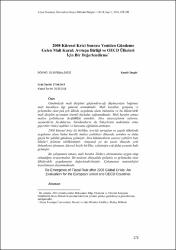| dc.contributor.author | Güngör, Kamil | |
| dc.date.accessioned | 2016-08-05T06:49:08Z | |
| dc.date.available | 2016-08-05T06:49:08Z | |
| dc.date.issued | 2016 | |
| dc.identifier.issn | 1302-1265 | |
| dc.identifier.uri | http://www.sbd.aku.edu.tr/arsiv/c18s1/b10kamilg%C3%BCng%C3%B6r.pdf | |
| dc.identifier.uri | http://hdl.handle.net/11630/4354 | |
| dc.description.abstract | Günümüzde mali disiplini güçlendireceği düşüncesiyle bağımsız
mali kurallara ilgi giderek artmaktadır. Mali kurallar, gelişmiş ve
gelişmekte olan pek çok ülkede uygulama alanı bulmakta ve bu ülkelerdeki
mali disiplin açısından önemli faydalar sağlamaktadır. Mali kuralın amacı
maliye politikasını de-politize etmektir. Zira siyasetçilerin oylarını,
seçmenlerin faydalarını, bürokratların da bütçelerini maksimize etme
gayretleri bütçe açıkları ve harcama eğilimini artmıştır.
2008 küresel krizi ile birlikte, teoride tartışılan ve çeşitli ülkelerde
uygulama alanı bulan kurallı maliye politikası dünyada yeniden ve daha
güçlü bir şekilde gündeme gelmiştir. Zira hükümetlerin sınırsız yetkileri bazı
ülkeleri felakete sürüklemiştir. Anayasal ya da yasal düzeyde yeni
önlemlerin alınması, küresel krizle birlikte, eskisinden çok daha zorunlu hale
gelmiştir.
Bu çalışmanın amacı, mali kuralın Türkiye ekonomisine uygun olup
olmadığını araştırmaktır. Bu nedenle dünyadaki gelişmiş ve gelişmekte olan
ülkelerdeki uygulamalar değerlendirilmiştir. Çalışmanın metodolojisi
kıyaslamaya dayanmaktadır | en_US |
| dc.description.abstract | Today, independent financial regulations are increasingly becoming
popular as it is considered to strengthen and discipline fiscal policy.
Including both developed and developing ones, fiscal rules have been
implemented in a number of countries, provide significant benefits to enforce
fiscal discipline. The main purpose of the fiscal rules is to de-politicize the
fiscal policy as much as possible, given efforts of politicians to increase their
votes, those of voters to maximize their benefits, and those of bureaucrats to
expand their budgets have increased budgets deficits.
Starting with global crisis of 2008, rules-based fiscal policies are
discussed widely both in theory and they are practised in various countries.
So, it has come up again and more strongly in the world’s and Turkey’s
agenda. As result of the global crisis of 2008, it has become evident that
unlimited power of governments may lead to fiscal and economic disasters.
The new measures have become more necessary than ever both at
constitutional and legal level.
The purpose of this research is to investigate the fiscal rule whether
it complies with Turkish economy. Hence, some practises from developed as
well as developing countries have been analysed comparatively. | en_US |
| dc.language.iso | tur | en_US |
| dc.publisher | Afyon Kocatepe Üniversitesi | en_US |
| dc.identifier.doi | 10.5578/jss.26323 | en_US |
| dc.rights | info:eu-repo/semantics/openAccess | en_US |
| dc.subject | Mali Kural | en_US |
| dc.subject | Küresel Kriz | en_US |
| dc.subject | Bütçe Açığı | en_US |
| dc.subject | Kamu Borçları | en_US |
| dc.title | 2008 Küresel Krizi Sonrası Yeniden Gündeme Gelen Mali Kural: Avrupa Birliği ve OECD Ülkeleri İçin Bir Değerlendirme | en_US |
| dc.title.alternative | Re-Emergence of Fiscal Rule after 2008 Global Crisis: An Evaluation for the European Union and OECD Countries | en_US |
| dc.type | article | en_US |
| dc.relation.journal | Afyon Kocatepe Üniversitesi, Sosyal Bilimler Dergisi | en_US |
| dc.department | Afyon Kocatepe Üniversitesi, İktisadi ve İdari Bilimler Fakültesi, Maliye Bölümü | en_US |
| dc.identifier.volume | 18 | en_US |
| dc.identifier.startpage | 173 | en_US |
| dc.identifier.endpage | 198 | en_US |
| dc.identifier.issue | 1 | en_US |
| dc.relation.publicationcategory | Makale - Ulusal Hakemli Dergi - Kurum Yayını | en_US |



















